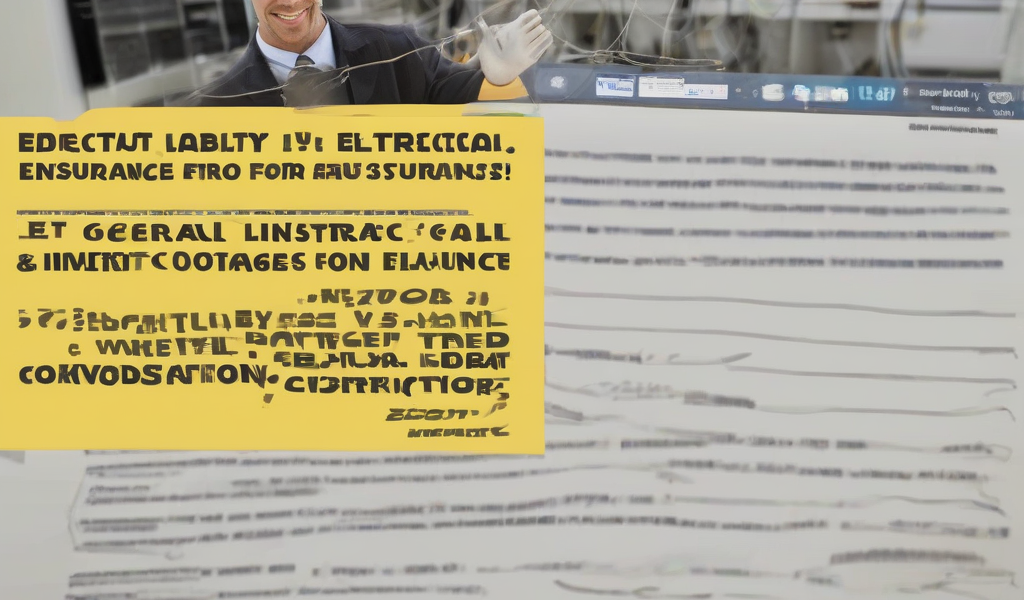Powering Up Your Business: A Comprehensive Guide to General Liability Insurance for Electrical Contractors
Powering Up Your Business: A Comprehensive Guide to General Liability Insurance for Electrical Contractors
The electrical contracting industry is inherently risky. From working at heights to handling powerful equipment and navigating complex electrical systems, the potential for accidents and injuries is ever-present. This is where general liability insurance becomes crucial. It’s not just a good idea; for electrical contractors, it’s a necessity to protect your business from significant financial losses stemming from unforeseen events.
Understanding General Liability Insurance for Electrical Contractors
General liability insurance, often abbreviated as GL insurance, protects your electrical contracting business from financial liabilities arising from bodily injury or property damage caused by your operations or employees. This includes claims from third parties – customers, clients, or members of the public – who are injured or whose property is damaged as a result of your work.
- Bodily Injury: This covers medical expenses, lost wages, and pain and suffering resulting from injuries sustained on your job site or due to your work.
- Property Damage: This covers the cost of repairing or replacing property damaged as a result of your work, such as accidental damage to a client’s home or building during an installation or repair.
- Advertising Injury: This less common coverage protects you from claims related to libel, slander, or copyright infringement in your advertising materials.
It’s important to note that general liability insurance does *not* cover damages caused by faulty workmanship or intentional acts. These typically fall under different types of insurance policies, which we will discuss later.
Why Electrical Contractors Need General Liability Insurance
The risks involved in electrical contracting are significantly higher than in many other industries. The potential for serious injury from electrical shock, falls, or burns is substantial. A single incident can lead to massive legal costs, medical bills, and potential business closure without adequate insurance coverage.
- Protection from Lawsuits: A lawsuit from a client alleging injury or property damage can be devastating, regardless of fault. General liability insurance provides legal defense and covers settlements or judgments up to the policy limit.
- Maintaining Client Trust: Carrying general liability insurance demonstrates professionalism and commitment to safety, reassuring clients that you’re prepared for potential issues. Many clients require proof of insurance before awarding contracts.
- Meeting Contractual Obligations: Many contracts explicitly require contractors to carry general liability insurance. Failure to comply can result in contract breaches and financial penalties.
- Protecting Your Assets: Without insurance, you could be forced to use personal savings or business assets to cover legal costs and settlements, potentially bankrupting your business.
- Peace of Mind: Knowing you’re protected from significant financial risks allows you to focus on running your business and providing quality services.
Key Considerations When Choosing General Liability Insurance
Choosing the right general liability insurance policy requires careful consideration of several factors:
- Coverage Limits: This refers to the maximum amount your insurance company will pay for a single claim or during a policy period. Choose limits appropriate to your business size and potential exposure to risk.
- Premium Costs: Premiums vary based on factors like your business size, location, number of employees, and claims history. Shop around to compare quotes from multiple insurers.
- Policy Exclusions: Carefully review the policy’s exclusions to understand what’s not covered. Common exclusions might include intentional acts, damage caused by faulty workmanship, and employee injuries (covered by workers’ compensation).
- Insurer Reputation: Choose a reputable and financially stable insurance company with a proven track record of handling claims efficiently and fairly.
- Additional Coverages: Consider adding endorsements or riders to your policy for broader coverage, such as professional liability insurance (errors and omissions insurance) or commercial auto insurance.
Types of Insurance Beyond General Liability
While general liability is crucial, electrical contractors often need additional insurance coverages to fully protect their business:
- Workers’ Compensation Insurance: This is legally required in most states and covers medical expenses and lost wages for employees injured on the job. It protects you from lawsuits filed by injured employees.
- Commercial Auto Insurance: If you use vehicles for business purposes, this coverage protects against accidents or damage involving company vehicles.
- Professional Liability Insurance (Errors and Omissions Insurance): This covers claims of negligence or mistakes in your professional services, such as faulty workmanship or design errors that lead to property damage.
- Umbrella Liability Insurance: This provides additional liability coverage above and beyond your general liability and other policies, offering higher limits of protection against catastrophic events.
The Claims Process: What to Expect
If you need to file a claim, here’s a general overview of the process:
- Report the Incident Promptly: Notify your insurance company as soon as possible after an incident occurs. Provide detailed information about the event.
- Cooperate with the Investigation: The insurance company will likely investigate the claim to determine liability and the extent of damages. Cooperate fully with their investigation.
- Maintain Accurate Records: Keep detailed records of the incident, including dates, times, witnesses, and any relevant documentation.
- Follow Your Policy’s Instructions: Adhere to the instructions and procedures outlined in your insurance policy.
Finding the Right Insurance Provider
Finding the right insurance provider requires careful research and comparison. Here’s a breakdown of the process:
- Identify Your Needs: Determine the specific coverage amounts and types of insurance your business requires.
- Get Multiple Quotes: Contact several insurance providers to obtain quotes and compare their offerings.
- Read Policy Documents Carefully: Before signing anything, carefully review the policy documents to understand the terms and conditions.
- Ask Questions: Don’t hesitate to ask questions about the policy’s coverage, exclusions, and claims process.
- Consider Your Budget: Balance the cost of insurance with the level of protection you need.
Protecting Your Electrical Contracting Business: A Final Note
General liability insurance is a cornerstone of risk management for electrical contractors. It’s not a luxury; it’s a necessity for protecting your business from potential financial ruin. By understanding the intricacies of general liability insurance and exploring additional coverage options, you can safeguard your investment and ensure the long-term success of your electrical contracting business. Remember to consult with an insurance professional to determine the best coverage for your specific circumstances. Failing to adequately insure your business can leave you vulnerable to potentially crippling financial consequences.




